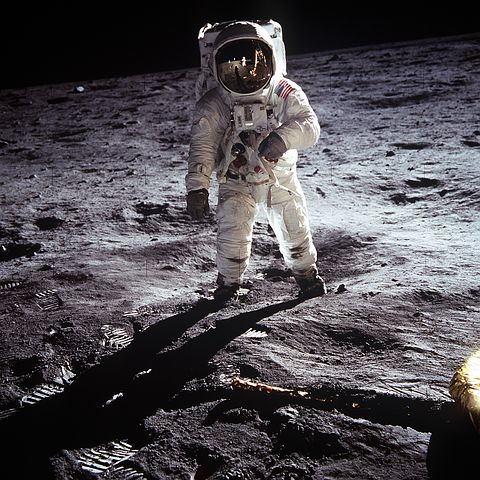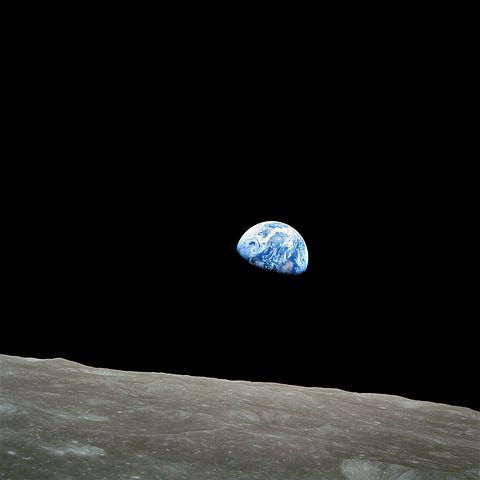Space Oddity von David Bowie
Das erste Mal habe ich Bowies berühmten Song in einem Film, dessen Namen ich vergessen habe, als Cover Verision gehört. Ein anderes Mal waren wir auf dem Rückweg von einer merkwürdigen Party in Mazedonien und die Handylautsprecher waren maßlos mit dem maximalen Volumen überfordert. Als die ersten Töne von Space Oddity erklangen, drehte sich Luke begeistert um, rief: „I love that song!“ und begann zu tanzen. Der Morgen schon am Horizont, den Countdown in den Füßen, starrten wir in den Himmel und begriffen, wie merkwürdig der Weltraum ist.
Faszination Weltraum – Raummerkwürdigkeiten
Das Lied von Bowie ist besonders, ohne Frage. Major Tom, ein Astronaut, verlässt die Erde, den blauen Planeten und treibt durch die Weiten des Raumes. Man lernt in der Schule, das Universum sei unendlich. Bloß wirklich verstehen tut das keiner. Der oft gehörte Satz: „Die Tiefsee ist weniger erforscht als das Weltall“ den uns umgebenden Raum schrumpfen lässt, haben die unbekannten Welten eine magische Anziehungskraft, die nicht vergleichbar ist.
Inspiration für Space Oddity – die Mondlandung?
Inspiriert wurde David Bowie von Stanley Kubricks Film 2001: Odyssee im Weltraum beziehungsweise mit dem Originaltitel 2001: A Space Odyssey. Der Songtitel spielt offensichtlich mit dem Filmtitel. Das Thema Weltraum ist zum Zeitpunkt der Veröffentlichung von Space Oddity mehr als präsent. Am 11. Juli 1969 releaste Bowie das Lied und nur fünf Tage später startete Apollo 11 als erste bemannte Weltraumexpedition in Richtung Erdtrabant. Obwohl der Song vor dem Start der Astronauten veröffentlich wurde, weigerte sich die BBC ihn im Radio zu spielen, bevor die Crew nicht wieder sicher von der Mission zurückgekehrt war. Deswegen schaffte es der Song zunächst nur auf Platz fünf der Charts und erst 1975 wurde die re-releasete Version zu Bowies erstem Nummer eins Hit in England.

Space Oddity und das Stylophone
Wie bereits erwähnt, hatte sich Bowie stark von dem Film 2001: Space Odyssey inspirieren lassen. Im Film wird das von Richard Strauss komponierte Stück Also sprach Zarathustra immer wieder aufgegriffen. Ähnlich wie bei diesem klassischen Werk, beginnt auch Space Oddity mit einem anfangs kaum hörbaren, sich langsam aufbauenden Instrumentalteil. Charakteristisch für Space Oddity ist das zu Beginn hörbare Stylophone. Es handelt sich hierbei um ein 1967 von Brian Jarvis erfundene Miniatur-Keyboard und wird von Bowie selbst gespielt. Der Bassist Herbie Flowers erinnert sich:
And David walking in the studio with a little thing that looked like a pack of cigaretts. And it´s a stylophone. It´s this little machine, that he bought I think in the newsagent on the corner. -Herbie Flowers
Durch dieses Instrument erzeugte Töne formen eine galaktische Atmosphäre und führen schließlich zur ersten Strophe.

Space Oddity – was steckt hinter den Lyrics?
Major Tom hebt ab, startet ins Unbekannte Universum. Kaum hat er es geschafft die Erde zu verlassen, holt sie ihn auch schon wieder ein. Die Bodenstation ist begeistert, und die Zeitungen möchten wissen, welche Marke er trägt. Belangloser könnte diese Frage nicht sein, vergleicht man sie mit der Bedeutung des Momentes für Major Tom. Er verlässt das Raumschiff, und schwerelos schwebt er über der Erde.
Er steht wortwörtlich über den Dingen, betrachtet den blauen Planten und erkennt, wie kleingeistig seine Bevölkerung ist. Tom wird still, löst sich los und gibt jede Kontrolle ab.
For here
Am I sitting in a tin can
Far above the world
Planet Earth is blue
And there‘s nothing I can do
Nach der Bridge folgen der ikonische, schnelle Akkordwechsel mit einem Intrumentalteil, der überleitet in die letzte aus Major Toms Perspektive gesungene Strophe. Er verabschiedet sich von der Welt und seiner Ehefrau und die Verbindung zur Bodenstation bricht ab.
This song Space Oddity is about a guy, an astronaut, that suddenly wanted to pull the plug on everything.
-Herbie Flowers
Und wenn man in die Sterne schaut und am Rand des Vorstellbaren steht, hinabblickt, dieses Ziehen im Bauch verspürend, dann macht dieser Wunsch vielleicht Sinn.



